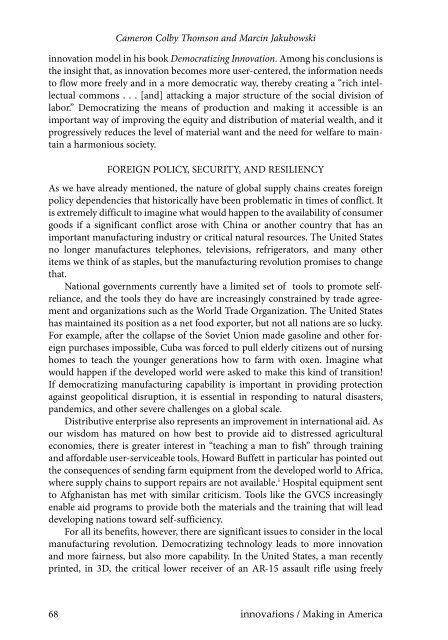Jakubowski-thomson
Jakubowski-thomson
Jakubowski-thomson
You also want an ePaper? Increase the reach of your titles
YUMPU automatically turns print PDFs into web optimized ePapers that Google loves.
Cameron Colby Thomson and Marcin <strong>Jakubowski</strong><br />
innovation model in his book Democratizing Innovation. Among his conclusions is<br />
the insight that, as innovation becomes more user-centered, the information needs<br />
to flow more freely and in a more democratic way, thereby creating a “rich intellectual<br />
commons . . . [and] attacking a major structure of the social division of<br />
labor.” Democratizing the means of production and making it accessible is an<br />
important way of improving the equity and distribution of material wealth, and it<br />
progressively reduces the level of material want and the need for welfare to maintain<br />
a harmonious society.<br />
FOREIGN POLICY, SECURITY, AND RESILIENCY<br />
As we have already mentioned, the nature of global supply chains creates foreign<br />
policy dependencies that historically have been problematic in times of conflict. It<br />
is extremely difficult to imagine what would happen to the availability of consumer<br />
goods if a significant conflict arose with China or another country that has an<br />
important manufacturing industry or critical natural resources. The United States<br />
no longer manufactures telephones, televisions, refrigerators, and many other<br />
items we think of as staples, but the manufacturing revolution promises to change<br />
that.<br />
National governments currently have a limited set of tools to promote selfreliance,<br />
and the tools they do have are increasingly constrained by trade agreement<br />
and organizations such as the World Trade Organization. The United States<br />
has maintained its position as a net food exporter, but not all nations are so lucky.<br />
For example, after the collapse of the Soviet Union made gasoline and other foreign<br />
purchases impossible, Cuba was forced to pull elderly citizens out of nursing<br />
homes to teach the younger generations how to farm with oxen. Imagine what<br />
would happen if the developed world were asked to make this kind of transition!<br />
If democratizing manufacturing capability is important in providing protection<br />
against geopolitical disruption, it is essential in responding to natural disasters,<br />
pandemics, and other severe challenges on a global scale.<br />
Distributive enterprise also represents an improvement in international aid. As<br />
our wisdom has matured on how best to provide aid to distressed agricultural<br />
economies, there is greater interest in “teaching a man to fish” through training<br />
and affordable user-serviceable tools. Howard Buffett in particular has pointed out<br />
the consequences of sending farm equipment from the developed world to Africa,<br />
where supply chains to support repairs are not available. 5 Hospital equipment sent<br />
to Afghanistan has met with similar criticism. Tools like the GVCS increasingly<br />
enable aid programs to provide both the materials and the training that will lead<br />
developing nations toward self-sufficiency.<br />
For all its benefits, however, there are significant issues to consider in the local<br />
manufacturing revolution. Democratizing technology leads to more innovation<br />
and more fairness, but also more capability. In the United States, a man recently<br />
printed, in 3D, the critical lower receiver of an AR-15 assault rifle using freely<br />
68 innovations / Making in America


